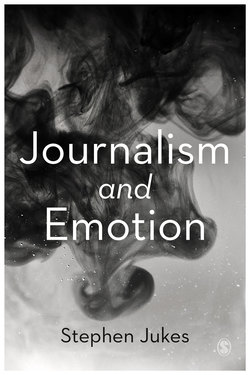Читать книгу Journalism and Emotion - Stephen Jukes - Страница 7
На сайте Литреса книга снята с продажи.
Acknowledgements
ОглавлениеThey say there is a novel buried deep in every journalist waiting to get out. This volume is certainly no novel, but it is a book that I have been carrying around in my head for at least the past two decades. Its roots lie in more than 20 years of work as a journalist and foreign correspondent around the world for the news agency Reuters. But it is only in the past few years, from the detached vantage point of the academic world, that I have been able to draw my ideas and reflections together into what is hopefully a coherent shape. I still passionately believe in journalism as a force for good, but it is clear, with hindsight, that the events of September 11, 2001, triggered in me a critical distance from the profession. That can only be healthy in today’s tumultuous media landscape, in which many of the certainties of the past have been thrown into question. The Introduction to this book describes how September 11 was a pivotal moment that drove me to stand back and explore the complex relationship between journalism, norms of objectivity and emotion. I would like to express my deep gratitude to all my friends and colleagues at Reuters with whom I covered so many summits, crises and, more often than not, the routine day-to-day stories that we call the news. I owe a particular debt to two – my first editor in the Middle East, the late François Duriaud, the ultimate professional and a legendary figure at Reuters; and his colleague as news editor and later successor as Middle East Editor, Graham Stewart. I learnt the trade from both and look back on those days with great affection. I also owe a debt of gratitude to two outstanding academics at Goldsmiths, University of London: Professors Natalie Fenton and Lisa Blackman. They painstakingly supervised my doctoral thesis, on which this book draws, often late on a Friday afternoon when many would be heading off for a weekend break. Natalie Fenton encouraged me to question journalism’s norms and shook me out of the comfortable world of my past. We did not see eye to eye on regulation of the British press (in the midst of the Leveson Inquiry) but her advice and guidance was invaluable. Lisa Blackman, in the next-door office of the New Academic Building at Goldsmiths, now the Professor Stuart Hall Building, introduced me to the world of affect, in all its (sometimes extreme) variations, opening up new horizons, new authors and a new way of thinking about journalism. At my home institution, Bournemouth University, I would like to thank my colleagues and particularly Barry Richards, one of the pioneering academics working in the field of psychosocial research into politics, culture and media. Further afield, thanks also go to Cardiff University professors Stuart Allan, a former colleague at Bournemouth University, and Karin Wahl-Jorgensen for their support and encouragement. The latter has been at the forefront of academic research into emotion and media and always, it must be said, several steps ahead of me. When I moved into the academic world in 2005, I also found a home in the Dart Center for Journalism & Trauma where I have been part of a drive to increase the emotional literacy of journalism and safeguard the mental health of journalists. I am indebted to the former BBC journalist Mark Brayne, who was inspirational in putting such issues on the agenda and introduced me to Dart. Since then, I have worked closely with the organisation’s Executive Director Bruce Shapiro and European Director Gavin Rees, both of whom are internationally recognised as experts in the field and have become firm friends. I would like to thank the team at SAGE for their support in planning and producing this book, Michael Ainsley and Amber Turner-Flanders. And special thanks are due to my wife Yvonne, whose painstaking proofreading has been invaluable, and children Dominic and Timothy. The cries of ‘are you still writing that book?’ echoing through the Bavarian countryside (as I messed up another holiday) have for the moment ceased. Until the next one …
